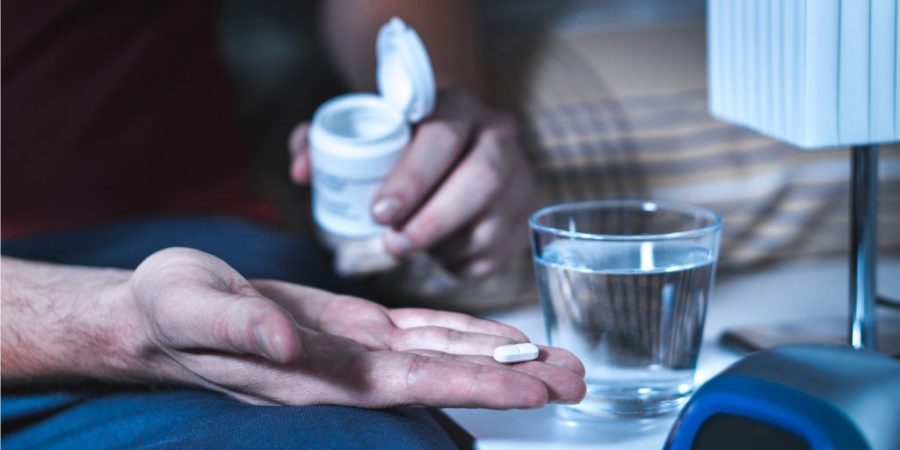
Z-drugs are hypnotics that were created as alternatives to other drugs for insomnia treatment. Previously, barbiturates or benzodiazepines were prescribed to combat sleeping difficulties, but risks associated with these sleep aids were often too great to overlook. But are z-drugs any safer? Learn more about z-drugs as sleeping pills and the risks associated with z-drug use.


Everyone has trouble sleeping from time to time. However, true insomnia can negatively affect a person’s quality of life. Ultimately, insomnia is not a mental illness by itself. Rather, it is generally a symptom of another condition, such as stress or depression. To treat this sleeping disorder, z-drugs were created in the 1990s as a solution to problems with other habit-forming sleeping pills like benzos. Unfortunately, more recent research has reported side effects of z-drugs similar to that of other prescription sleep aids, deeming sleeping pill addiction or dependency legitimate risks of taking these prescriptions.
Table of Contents
What Are Z-Drugs?
Z-drugs are prescription medications used to treat sleep disorders and insomnia. They central nervous system depressants were dubbed “z-drugs” due to the names of the generic drug which often starts with a Z. These prescription sleep aids include:
- Zaleplon (Sonata)
- Zolpidem (Ambien)
- Zopiclone (Imovane)
- Eszopiclone (Lunesta)
These sleeping pills work by slowing down activity in the brain. Similar to benzodiazepines, z-drugs accomplish this by affecting GABA in the brain, a neurochemical responsible for regulating excitability in the central nervous system. Therefore, when a z-drug is taken, a person feels a sense of calm and sedation, leading to sleep.
Sleeping Pill Side Effects
As with any prescription drug, taking z-drugs does not come without risk. Common side effects associated with z-drug prescription sleep aids range from hangover-like fatigue to deep sedation or coma. Additionally, if these sleep aids are taken regularly, side effects are more likely to occur and intensify over time.
Other z-drug side effects include:
- Nausea or vomiting
- Dizziness
- Headache
- Hallucinations
- Dry mouth
- Metallic taste
- Loss of coordination
- Confusion
- Amnesia
- Depressed breathing rate
Sleepwalking and Other Parasomnias
Among the most concerning side effects of sleep pills are behaviors called parasomnias. Parasomnia behaviors include activities like sleepwalking, sleep driving, making phone calls while asleep, sleep eating, etc. Usually, a person has no memory of the parasomnia activities they carried out while sleeping. However, these activities endanger both the person performing the sleep activities and those around them. In an attempt to avoid these behaviors, the drug should never be used if a person cannot commit to a full night’s sleep.
Long-Term Side Effects of Sleeping Pills


Z-drugs were originally thought to be a non-addictive alternative to other prescription sleep aids. However, research has indicated that this is not the case and that long-term risks actually parallel that of sleeping pills like Xanax or Valium (benzos). Considering this, the potential long-term side effects of z-drugs include:
- Tolerance:
Drug tolerance occurs when more of the drug is needed to create the same effect, or when the original dosage no longer works. - Dependence:
Once the body has adapted to the presence of the substance, it will depend on it to function normally. Drug dependence is the result of ongoing drug use. - Addiction:
Drug addiction refers to the psychological drive to continue using a substance despite experiencing negative effects from using the drug. Symptoms of sleeping pill addiction include a preoccupation with taking the drug, using the pills recreationally, or running out of a prescription too quickly. - Withdrawal:
Once a dependency on z-drugs has formed, withdrawal symptoms will occur if the drug is stopped suddenly. Signs of withdrawal include rebound symptoms such as insomnia, cravings, anxiety, tremors, palpitations, and delirium.
Other long-term side effects of z-drugs include chronic issues such as digestive issues, headaches, dry mouth, and decreased muscle coordination.
Additional Issues with Z-Drugs as Sleep Aids
While z-drugs are not benzodiazepines, they work in a similar fashion to benzos and come with many of the same risks. Just like benzo prescriptions, z-drugs are meant to be a short-term solution to sleeping issues. Once drugs like Ambien and Sonata have been used for several weeks or more, the body may rely on the drug to function. If this type of dependency occurs, withdrawals will be experienced if the drug is suddenly stopped.
In conjunction, z-drugs have a high potential for misuse, especially if they are used with other drugs (including alcohol). In fact, combining z-drugs with any other depressant can lead to a life-threatening overdose. Ultimately, the risks of taking z-drugs have become prominent enough to warrant a black box warning from the FDA, which is the most stringent warning label available to inform consumers of potentially detrimental side effects.
Treatment for Sleeping Pill Addiction in Florida
Fortunately, treatment for sleeping pill addiction and dependence is available. Usually, the first step to treating an addiction to sleep aids is drug detox. At the Blackberry Center near Orlando, Florida, our addiction treatment center offers medically supervised drug detox to gradually taper a person off of z-drugs while minimizing the effects of withdrawal that so often lead to relapse. In fact, quitting these sleeping pills cold turkey is not recommended due to the difficult nature of z-drug withdrawals.
Once stabilized inpatient addiction treatment is often the next step. It is during this time that the nature of the addiction can be addressed. In addition to inpatient rehab, other options for z-drug addiction treatment at our Florida rehab center include partial hospitalization (PHP) and dual diagnosis. In this way, the treatment team at the Blackberry Center is able to address the root of the addiction how it relates to a person’s mental health.
If you or someone you know is battling sleeping pill addiction, the time is now to address any concerns over quitting. To learn more about our addiction treatment programs, call our admissions team at 888-512-9802 or submit a confidential contact form, oftentimes we can get you started on your recovery the same day as you call. And rest assured that at the Blackberry Center in St. Cloud, Florida, we are here for you every step of the way, which includes long after you finish treatment at our central Florida rehab.
The post Are Z-Drugs Safe? The Dangers of Sleeping Pill Addiction appeared first on The Blackberry Center of Central Florida.
Source
Original Author: The Blackberry Center

